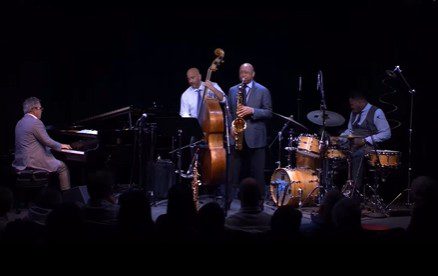Branford Marsalis took to the stage at Theatre Maisonneuve alongside his longstanding quartet, consisting of pianist Joey Calderazzo, bassist Eric Revis, and drummer Justin Faulkner. This is a configuration that has been intact since their 2012 release Four MF’s Playin’ Tunes, but the musical relationships between these ‘MF’s’ goes back further than that, and their familiarity is clear to see.
As it happens, the set started the same way the 2012 album did, with a Calderazzo composition titled “The Mighty Sword.” The band passed the melody around and played with a broken time feel, obscuring the beat slightly, before Faulkner introduced a more grounding pulse. Calderazzo took the first solo amid notably busy drum comping. This may have posed issues in lesser musicians but the interplay between the band members was such that nobody got in each other’s way. Branford took the next solo, starting during something of a climax. This created an interesting dynamic arc for the piece as a whole, which ended not with a typical restating of the main melody, but with a sharp cutoff at the end of Marsalis’ solo.
The rest of the set was just as full of surprises, with the band cycling through a mixture of original compositions, reinterpretations of classic jazz repertoire, and multiple Keith Jarrett selections – unsurprising seeing as the band’s latest release is a tune-for-tune reimagining of Jarrett’s album Belonging. There were entire songs played entirely in rubato time, without ever establishing a clear tempo, solos that softly emerged from collective improvisations, and tunes that nodded to the swing era at the start before finishing in a feel more similar to John Coltrane’s early 1960’s output. Perhaps the biggest surprise of the night came from Justin Faulkner’s touch on the drums; I have rarely (if ever) seen a jazz drummer hit the drums as hard as he did. There were several moments where the drumming called to mind heavy metal styles more than jazz, almost overwhelming the ear but never ceasing to serve the music.
Something else worth noting is the way the quartet handled standards from the 1920’s and 30’s – Fred Fisher’s “There Ain’t No Man (Worth the Salt of My Tears)” and Jimmy McHugh’s “On the Sunny Side of the Street.” These selections contrasted from the rest of the set, with the arrangements clearly leaning towards the idiom of jazz’s early days while incorporating more contemporary approaches to tempo, rhythm, tone, and harmony. The group never fully settled into the swing era here, but never fully left it either, settling uniquely into something of an ‘uncanny valley’ and demonstrating a shared respect for this music’s rich history.
The lasting musical relationships Marsalis and co. displayed demonstrate a clear understanding of each other’s individual sounds as well as that of the collective. That being said there is also a sense that on a different night, audiences might hear something completely different than what they played at Maisonneuve. Their music is tight and well-grounded, and yet, nothing seems to be off limits.
























